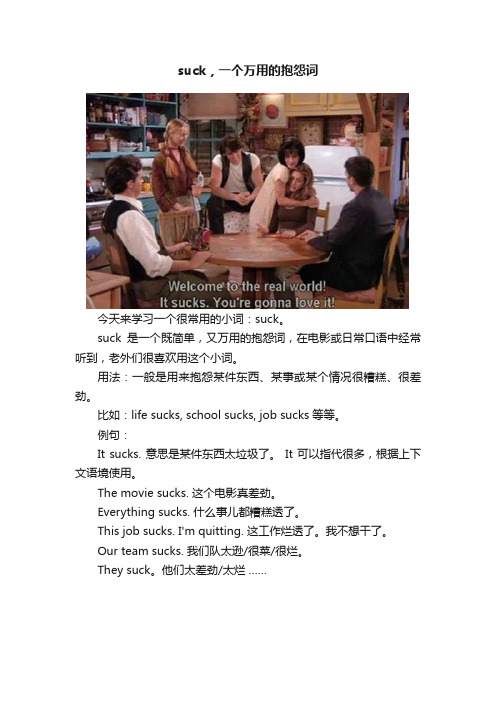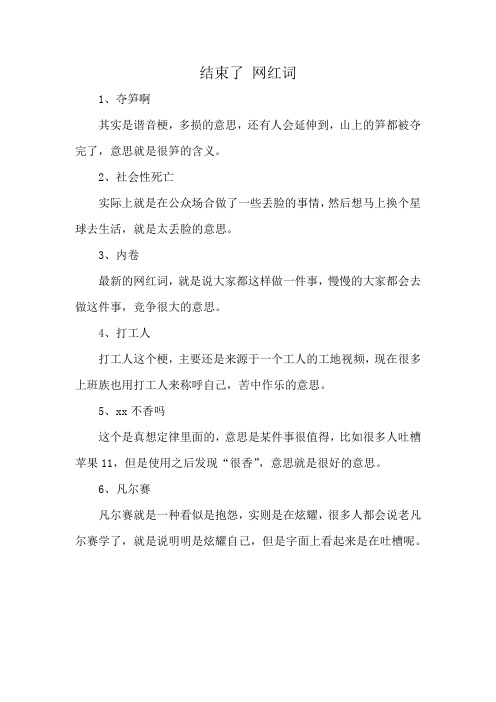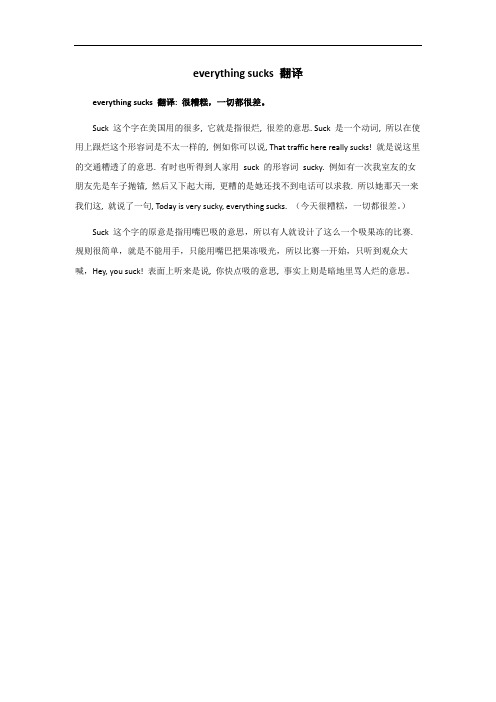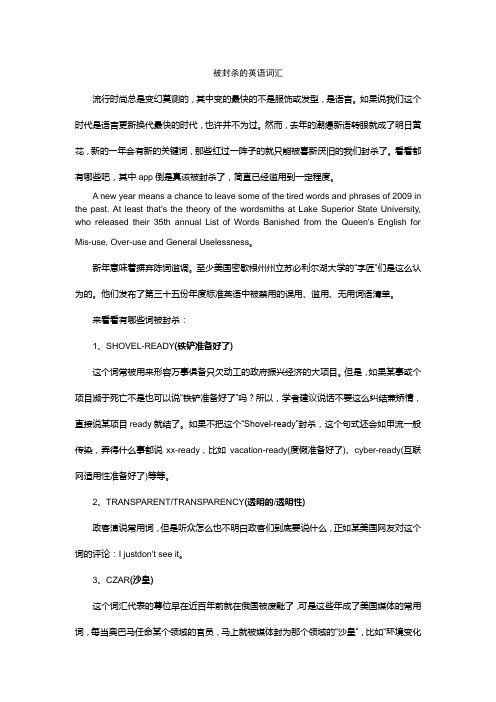国外那些被用滥了的网络热词
外国的网络流行语

外国的网络流行语外国的网络流行语网络用语可不止中国有,外国也有属于他们文化特色的网络用语,下面是小编给大家整理的关于外国的网络流行语,欢迎阅读!外国的网络流行语 11、 jk(just kidding、:开玩笑,别当真。
2、 omg(oh my god、:我的天啊!有时为了表达更强烈的情感,有人会打:OMGGGGGGG!3、 idk(I dont know、:我不知道。
4、 imho, imo(in my humble opinion, in my opinion、:在我看来,常见于论坛。
5、 lol(laugh out loud、:大声地笑。
这个缩写已经快被用烂了。
6、 Imao(laughing my arse/ass off、:笑死我了。
遇到真正搞笑的事,可以这么说,不过有点粗俗。
7、 rofl(rolling on the floor laughing、:笑到摔到地上。
8、 roflmao(rolling on the floor laughing my ass of、:前两个的结合版,也就是超级搞笑的意思。
9、btw(by the way、:这个大多数人都会用,就是“顺便再说一句”的意思。
10、 g2g(got to go、:要走了。
原句是Ive got to go。
11、 ttyl(talk to you later、:下次再说。
12、 brb(be right back、:很快回来。
也就是Ill be right back 或Im gonna be right back的简写。
13、 sth(something、:某事某物。
14、 nth(nothing、:什么也没有。
15、 plz(please、:请。
please 字尾是z 音,所以按照读音缩写为plz。
16、thx(thanks、:谢谢。
按照发音来看,thanks字尾的ks可以用字母X代替。
外国的'网络流行语 21、人民至上,生命至上to put people and life above everything else2.逆行者heroes in harm’s way3.飒spirited4.后浪houlang(lit: behind wave、, referring to today’s younger generation5.神兽shenshou(lit: mythical creatures、 to refer to naughty children6.直播带货live streaming commerce7.双循环domestic and international circulations8.打工人dagongren, which refers to people who work for others9.内卷involution10.凡尔赛文学Versailles literature外国的网络流行语 31.earworm“常在耳边回响的歌曲”,这个单词是由ear和worm组成的,其中worm就是“小虫子”的意思,字面意思就是“耳朵里有小虫子”。
部分英语网络用语、网梗词解(4)

部分英语网络用语、网梗词解(4)●based正常情况下是指“有实据的”,用来支持别人的论点。
和biased (偏颇的) 很像。
现在在网络_上则通常反用其意,用来讽刺。
●your mother面意思。
类似“钝角”,在完全无关的情况下发一个"your mother"。
于“do your mother.....咳咳、总之,个人认为这个梗比较粗俗,不建议使用。
●chad指很有型、很自信的男性。
类似"靓仔”或者“帅哥”。
现在网上比较少见了。
●Morbius最近的新梗,指漫威最近的英雄电影。
因为太烂,结果在国外当成梗来取笑。
常见变体有"morb”和"morbing",跟"钝角"类似,没什么实际意义。
●Nobody:国内经常翻译做“没有人:”,不过听起来很怪。
这个词当做梗的时候本身没有什么意思,只是用来作开头,强调梗的后半段时突然发生的。
有时候为了加强语气还会补上一句"Not a single soul"。
●Hmm yes the floor is made out of floor源自一张《玩俱总动员》巴斯光年出场的截图,被人打上了“Hmm yes the floor is made out of floor”的文字。
可以用作回应废话文学,或者在理应说话但不知道该说什么的时候用。
inb4“In before"的意思。
就是你已经猜到和你对话的人会有什么反论,所以自己先一步说出来,减少双方麻烦,方便自己继续立论。
●接下来就是题外话。
Apparent、 literal、 technical和actual的确分别是“显然”、“字面”、“技术层面”和“事实”的意思,但是加个“一ly”的话意思会有不同。
Apparently通常解作“(照目前情况来看)原来' 而不是‘显然地”;Literally既可以是“字面上的”也可以是“真的”(就真的是真的那种真的) ;Technically虽然可以是技术上的但是更常是“严格来说”的意思;Actually相比起译作“事实上”,不如译成其实”来得自然。
精选65句被老美说烂但教科书只字不提的地道美国俚语,看完记住可以完全融入美国生活

精选65句被老美说烂但教科书只字不提的地道美国俚语,看完记住可以完全融入美国生活。
1. kick ass 了不起2. kiss ass 拍马屁3. XYZ 检查你的拉链4. Hit the road. 上路了。
5. hang out 和朋友在一起6. click (两人)合得来7. suck 差劲;糟透了8. catch some Zs 小睡一下9. take a dump 上大号10. crank up 把声量调大11. Shoot! 说吧!有屁快放!12. Give it a shot! 试试看!13. Got you! (骗、吓…)到你了吧!14. no-brainer 不必花脑筋的事物15. work one’s butt off 很努力地(做一件事)16. push around 驱使(某人)17. brush off 不理;默视18. boss around 颐指气使19. Oh, boy! 乖乖! 唉呀! 真是!20. bound to 必定21. all set 都准备妥当22. dirty work 卑鄙的工作;讨厌的工作23. cop 警察24. spooky 玄;可怕的25. Say cheese. (照相时)笑一个26. eat 使困扰;使不开心27. jazz (something) up 让(一件事物)变得有趣些28. My hands are tied 我无能为力29. love handles 游泳圈、胖的腰围30. maxed out 累惨了31. If You Snooze, You Lose! 如果你不注意,就错过良机了。
32. jerk one’s chain 烦(某)人33. have a cow (俚语)非常生气34. knock it off! 住手!(不要再做某事)35. my ass 才怪!(表示强烈的质疑)36. big time 非常;很;大大地37. the man (the Man) 大哥;厉害的人38. on the nose (时间的)整点;完全39. on the spot 让(某人)在压力下作决定;当场40. Way to go! 作得好!加油!41. armpit 脏而令人不舒服的地方42. buns 屁屁43. pissed (off) 非常生气44. kick back 轻松休息45. okay 不错的46. shake a leg 赶快47. pull one’s leg 开玩笑48. booboo 错误49. dynamite 极佳的;危险的50. lame 差劲的51. flashback 忽然间勾起的回忆52. blow one away 棒得令人折服53. fill in 替补54. fill someone in 告诉某人,让他了解一些状况55. Get with it! 跟上(时势、潮流、事情的发现状况等)吧!56. the bottom line 最主要的57. go the extra mile 多付出代价;多努力一点58. in the driver’s seat 掌有控制权59. 24-7 一天到晚;全天候60. missing the boat 错过(好机会、好东西等)61. screw around 胡闹;不作正经事62. screw around with someone 招惹某人;对某人态度随便63. tell it like it is 实话实说64. go places (在社会上等)成功;有成就65. beat around the bush 避重就轻;回避某些话题。
被英国人用烂的地道俚语

被英国人用烂的地道俚语入乡随俗,到腐国留学,当然要说英语了。
可是,到了腐国才发现,只会说英语还不行,因为英国人日常生活中脱口而出的是俚语!所以要想融入当地的朋友圈,这些被腐国人民用烂了的地道英式俚语,还不赶紧戳进来?1.sauage fest意思:人山人海,人满为患。
【Sauage火腿 fest,集会,节日】用法:“The club was fuckingterrible last night, it was a proper sausagefest there.”昨晚这间酒吧好吵,真的是人满为患。
2.the dog’s bollocks意思:最好的【bollocks 胡说】用法:“That bacon sandwich I had this morning was theabsolutedog’s bollocks.”今天早上吃的那个培根三明治真的是最棒的。
3.fell arse over tit意思:跌得不轻用法:“You were so pissed (恼火)lastnight mate, you walked outof the pub and fellarse over tit in the street.”哥们,你昨晚太恼火了,走出酒吧,就在大街上跌倒了。
4.as the actress said to the bishop意思:引出一个暗讽用法:“Oh my, look at the size of that sausage…as the actress said to the bishop.”啊,好吧,看看这根香肠(多大吧),呵呵。
5.donkey’s years意思:很长一段时间用法:“How’s your friend Lisa fromschool?” “Oh, god knows. Ihaven’t seen her for donkey’s years.”你的朋友lisa怎么样了?天知道,我好久没见她了。
全球各地脏话大比拼看看哪家最强

全球各地脏话大比拼看看哪家最强要问骂人技术哪家强,这真的很难比。
不过今天小编给大家整理出来了20条不同国家骂人的话,真的是世界之大无奇不有,各种骂人话无所不包。
接下来,一起来看看20个国家都有哪些骂人脏话。
1、西班牙:你丑得让洋葱都哭了。
这句话的逻辑是这样的,大家切洋葱都会哭。
但反过来,你丑得让洋葱都哭了,说明你真的是有够丑的。
2、德国人:关灯才能睡你。
这句话透着一股子德国人的严谨风啊。
太丑了,只能关灯才能睡,恩,好像确实是很有道理啊。
不过话说回来,起码也睡到了呀。
3、中国人(广东话):蛇头鼠眼。
这里的蛇和鼠不是动物,而是和忠诚、道德诚信挂钩的意向。
因此这个词主要是用来指责某人狡猾阴险。
有种绕了一大圈居然圆回来的感觉,哈哈。
下次有机会再教教他们獐头鼠目和贼眉睡眼好了。
4、匈牙利人:在青蛙屁股底下。
这句话的意思主要是指一个人有多么的被人忽视。
还举了个例子说,如果你人在国外,然后没有融入到当地文化里,大概就是这种境地。
好吧。
5、塞尔维亚人:祝你老婆生个蜈蚣,你一辈子忙着赚钱给它买鞋穿。
不用解释了,太损太形象了!要是哪天你听到一个塞尔维亚人对你说这句话,那估计你是真的把他惹恼了。
6、英格兰人:她的脸就像是一个装满扳手的袋子。
虽然听起来还挺实用的,但其实是在骂人丑啦!7、保加利亚人:你丑得像盘沙拉。
终于出现啦,你丑得像盘沙拉这句话出自的正是保加利亚。
啊,好想点一盘保加利亚的沙拉看看究竟有多丑,或者找个保加利亚人聊聊为什么他们这么看不起沙拉啊。
8、苏格兰人:Glaikit就是 Stupid 。
9、亚美尼亚人:简直就是看傻逼吃石榴。
这句话是用来形容某人很笨拙的。
还蛮有画面感的。
10、澳大利亚人:猩猩。
(主要针对红头发的人)澳大利亚侮辱红头发的人就会说他们像猩猩。
11、瑞典人:找块旧毯子遮住你吧(走,藏到旧东西下边去)这句话主要是形容某人说了或做了某件非常丢脸的蠢事。
然后瑞典人觉得,做完蠢事之后找块旧摊子遮住自己会看起来更蠢,于是就这么说了……12、马来西亚人:走在老板后面,还得接着他的蛋。
老外损人最常用的10个英语单词

老外(Foreigners)损人最常用的10个英语单词1. "Weirdo" - 怪人这个词通常用来指代一个奇怪或者古怪的人,常常被用来调侃别人行为怪异或者举止怪异。
2. "Loser" - 失败者这个词用来用来贬低别人,意味着某人是一个失败者或者无能者。
3. "Creep" - 古怪的人这个词用来形容一个让人讨厌或者让人害怕的人,通常指那些做出让人不舒服的事情的人。
4. "Slacker" - 游手好闲这个词用来形容一个懒惰、不负责任的人,通常用来责备某人不努力工作。
5. "Nerd" - 书呆子这个词用来形容一个沉迷于学术或者技术方面的人,通常带有贬义。
6. "Snob" - 势利眼这个词用来形容一个自视甚高、高不可攀的人,通常指那些看不起他人的人。
7. "Liar" - 说谎者这个词用来指代一个经常说谎的人,带有强烈的贬义。
8. "Cheat" - 欺骗者这个词用来形容一个欺骗、作弊的人,通常用来批评某人不诚实。
9. "Clueless" - 毫无头绪这个词用来指代一个毫无头绪、一无所知的人,通常用来贬低某人的智商或者认知能力。
10. "Douchebag" - 讨厌的人这个词用来指代一个讨厌、让人不舒服的人,通常带有强烈的贬义。
总结外国人使用这些词汇时,往往是在情绪激动或者愤怒的时候。
这些词汇本身带有强烈的侮辱、贬低的意味,因此使用时需要谨慎。
在与老外交流时,我们需要保持冷静理智,避免使用这些词汇,尊重他人,保持友好和谐的交流氛围。
由于各种原因,老外在与我国人交流中可能会使用一些有贬义的词语来损人。
这些词语虽然用于直接指责对方,但在一些情况下也可能只是调侃或者开玩笑。
了解这些常用的英语单词有助于我们更好地理解老外的交流方式,调整自己的情绪和应对方式,保持良好的交流氛围。
学会这些词,看英语网文再也不会懵圈了

学会这些词,看英语网文再也不会懵圈了下面这些词语在英文网络上到底有多火:火到已经有一所美国大学提议2016年禁用它们了。
那咱们就一起来看看这些让老外又爱又恨的网络流行热词吧!1. secret sauce: “秘诀”,由其原意“秘制酱料”引申而来The professor shared the secret sauce to a company's success.教授跟大家分享了公司经营成功的秘诀。
2. break the Internet: “使网络瘫痪”,某人、某消息太火,在网上疯传,网络都快被它搞瘫痪了Kardashian broke the Internet with her butt.卡戴珊凭借她的屁股就能火遍网络。
3. slay: “赞,厉害,通吃”,多用于形容娱乐圈人士,本义为“消灭,毁灭”Miley's new album slayed.麦莉的新专辑太赞了。
4. presser: “新闻发布会”,presser本义为“熨衣工”,这里是press conference 的简写I can kind of understand why Obama cried in that presser.我有点理解为什么奥巴马在新闻发布会上落泪了。
5. manspreading: “大爷式坐姿”,指公交地铁等处,男性为了自己舒服,岔开腿坐着The dudes took up all the space with their manspreading.那伙人都岔开腿坐着,把空间全占了。
6. giving me life: “赐予我新生”,一种夸张的赞叹,抒发感慨,多用于社交媒体,具体翻译可根据语境This soundtrack is giving me LIFE!这歌太好听啦!(给我第二次生命!)This nailpaint is giving me life.这甲油棒棒哒。
(好的无法形容啦!)7. physicality: “霸气,威慑力”,体育主播、球迷们爱用的一个词儿,用来形容运动员Serena Williams highlighted her physicality in the game.小威廉姆斯霸控全场。
网络流行语英语俚语大全

当我们平时在聊微信或者面对面聊天时,常会用到一些网络流行语或者常用的俚语,老外也一样。
比如他们会用“RT”来表示“retwitter”,字面意思转发一条twitter,但其实这还表示强烈同意,非常认同。
可以用在朋友们说了一个你很赞同的观点之后,你说RT,就相当于国内的+1。
—— This food is delicious.—— RT.再比如,他们有时候会说“You're green.”这里不是“你被绿了”的意思,而是用来表示“你太没经验了。
”因此,当客户跟你聊message的时候,有时会习惯使用一些俚语,这让他们能更好的表达自己当下的感觉。
而你要做的就是听到的时候“知道他在说什么”。
但请注意,这些俚语适合在社交媒体或非正式场合使用,切不可在正式的书面文体中用哦!以下常用的英语俚语,建议随手收藏,这样跟客户聊天时可以显得更native!1. click:(两人)合得来I think we two really click.我觉得我们两个蛮合得来的。
2. suck:差劲; 糟透了That sucks.差劲!3. eat:使困扰;使不开心What's eating you?什么事让你不开心呢?备注:这是个很常听到的俚语。
当你觉得某个人不大对劲, 就可以用这句话来问发生什么事了。
4. john 厕所I have to go to the john.我要去厕所。
备注:这里的“john”不是约翰的意思,而是指厕所。
5. catch some Zs 小睡一下Sorry. I have to catch some Zs.抱歉!我想小睡一下。
6. kick ass 了不起You just kick ass.厉害了!7. spring for 请客Let me spring for dinner.这一顿我请。
8. hit the road 出发上路了I really need to hit the road.我真的得出发了。
看英文片然必了解的不文明的语言

77. I detest you! 我恨你!
78. Get the hell out of here! 滚开!
79. Don’t be that way! 别那样!
80. Can’t you do anything right? 成事不足,败事有余。
86. Don’t give me your attitude. 别跟我摆架子。
87. You’ll be sorry. 你会后悔的。
88. We’re through. 我们完了!
89. Look at the mess you’ve made! 你搞得一团糟!
90. You’ve ruined everything. 全都让你搞砸了。
二,粗话骂人
1. dork 呆子,呆瓜;当一个人做了某些傻事的时候,就可以骂他dork,虽然是呆子的意思,但实际上并不是说他智力低下,有时在情侣间,一方做错了某事,也咳说dork来责怪他,有“真傻”的意思。
2. nerd/geek 讨厌鬼 nerd表示“讨厌的人”也有“蠢货”的意思,和dork类似;geek是“讨厌鬼”,两个词的用法大同小异。
99. Don’t push me ! 别逼我!
100. Enough is enough! 够了够了!
101. Don’t waste my time anymore. 别再浪费我的时间了!
102. Don’t make so much noise. I’m working. 别吵,我在干活。
10.bastard 混蛋, 讨厌鬼;很常用的一个词,原来的意思是“私生子”,现在俚语里当“混蛋”用,但有时两个朋友开玩笑的时候也可当“家伙”来理解,并不一定是骂人哦。
suck,一个万用的抱怨词

suck,一个万用的抱怨词
今天来学习一个很常用的小词:suck。
suck是一个既简单,又万用的抱怨词,在电影或日常口语中经常听到,老外们很喜欢用这个小词。
用法:一般是用来抱怨某件东西、某事或某个情况很糟糕、很差劲。
比如:life sucks, school sucks, job sucks等等。
例句:
It sucks. 意思是某件东西太垃圾了。
It 可以指代很多,根据上下文语境使用。
The movie sucks. 这个电影真差劲。
Everything sucks. 什么事儿都糟糕透了。
This job sucks. I'm quitting. 这工作烂透了。
我不想干了。
Our team sucks. 我们队太逊/很菜/很烂。
They suck。
他们太差劲/太烂……
尽管这个小词很好用也很常用,但尽量不要用suck去抱怨别人。
指人时,这个词的说法还是比较rude的,有骂人的嫌疑。
一般朋友之间开玩笑地说说还无妨,如果是陌生人,或上下级、长辈之间,还是尽量不要用,以免引起不愉快。
国外潮词!又讽刺又刻薄,令人伤心但又很搞笑

国外潮词!又讽刺又刻薄,令人伤心但又很搞笑最近,国外又兴起了一批潮流词汇,英大看了真是觉得又讽刺又刻薄……分享给你们一起看一下。
screen-rage怒喷屏幕Definition:to talk back, yell or curse at a digital screen.定义:对着电子屏幕回骂、大喊或咒骂。
Example sentence:‘I got screen-rage when I read his text message.’例句:“我看到他的短信后怒喷屏幕。
”Who hasn’t talked back to their computer or their smartphone? Screen-rage is something almost everyone has experienced. Though ‘rage-quit’ was recently added to , screen-rage’s chances look less than stellar. So far, there’s only one example of the word in the Oxford English Corpus – from 2006.谁没试过对着电脑和手机回骂呢?怒喷屏幕几乎是每个人都做过的事。
“怒退”不久前才被收入牛津在线词典,不过“怒喷屏幕”加入的可能似乎并不大。
自2006年到现在,这个词在牛津英语语料库里只出现过一次。
moblivious盯着手机不留心Definition:staring at your phone whilst walking or driving and oblivious of your surroundings.定义:走路或开车时盯着手机,没有注意周围的情况。
Example sentence:‘Staring intently at her phone, she was completely moblivious to what was going on.’例句:“她专注地盯着手机,完全没有留意正在发生什么事。
结束了 网红词

结束了网红词
1、夺笋啊
其实是谐音梗,多损的意思,还有人会延伸到,山上的笋都被夺完了,意思就是很笋的含义。
2、社会性死亡
实际上就是在公众场合做了一些丢脸的事情,然后想马上换个星球去生活,就是太丢脸的意思。
3、内卷
最新的网红词,就是说大家都这样做一件事,慢慢的大家都会去做这件事,竞争很大的意思。
4、打工人
打工人这个梗,主要还是来源于一个工人的工地视频,现在很多上班族也用打工人来称呼自己,苦中作乐的意思。
5、xx不香吗
这个是真想定律里面的,意思是某件事很值得,比如很多人吐槽苹果11,但是使用之后发现“很香”,意思就是很好的意思。
6、凡尔赛
凡尔赛就是一种看似是抱怨,实则是在炫耀,很多人都会说老凡尔赛学了,就是说明明是炫耀自己,但是字面上看起来是在吐槽呢。
everything sucks 翻译

everything sucks 翻译
everything sucks 翻译: 很糟糕,一切都很差。
Suck 这个字在美国用的很多, 它就是指很烂, 很差的意思. Suck 是一个动词, 所以在使用上跟烂这个形容词是不太一样的, 例如你可以说, That traffic here really sucks! 就是说这里的交通糟透了的意思. 有时也听得到人家用suck 的形容词sucky. 例如有一次我室友的女朋友先是车子抛锚, 然后又下起大雨, 更糟的是她还找不到电话可以求救. 所以她那天一来我们这, 就说了一句, Today is very sucky, everything sucks. (今天很糟糕,一切都很差。
)Suck 这个字的原意是指用嘴巴吸的意思,所以有人就设计了这么一个吸果冻的比赛.规则很简单,就是不能用手,只能用嘴巴把果冻吸光,所以比赛一开始,只听到观众大喊,Hey, you suck! 表面上听来是说, 你快点吸的意思, 事实上则是暗地里骂人烂的意思。
外网梗素材

外网梗素材国内外的喜好还是会有所区别,但是有一样东西,国内外网友的操作几乎是一致的,那就是对jojo的玩梗。
你可以不看jojo,也可以不了解里面的内容,但是你一定会沉迷jojo的梗中无法自拔。
下面是一些外网流行梗,你能看懂几个。
01第一个:丢大包的DIO果然国外的网友们也是大爱JOJO!平时看欧美电视剧的时候我们可以看到,外国人在上厕所的时候,经常习惯性拿一份报纸或者杂志。
这张图也是说明了有了jojo之后,你就再也不用担心如厕枯燥了。
你要担心的应该是另一个问题……02第二个:动漫不能只存在一季大热的像是海贼王、名侦探柯南这种,就从来都不按季来划分,它们一更起来就是上百集的连载。
但是jojo不一样,jojo总是会在你不经意间进行完结,又在不经意间开启新的一季作品。
如果大家要补番的话,就还是推荐从第一部开始看起来,因为它的内容是连贯的。
03第三个:没有人能逃脱早逝诅咒,除了二乔作为一名jojo,二乔的个性也是和他的祖父截然不同。
因为他与生俱来的正义感和波纹力量,也在说明着,他的这一生绝然不会仅仅是一个普通人。
的确二乔的一生很不普通,他看过了身边太多人的生死离别。
不知道这样的经历到底算是幸运还是不幸?二乔身边的人一个个都受到了早逝诅咒,特别是到了第六部的时候,他更是体会到了什么叫做白发人送黑发人。
但即便如此,二乔依然没有受到死神的追击,他还是在这个世界上活得好好的,然后继续见证他身边下一个人的死亡。
所以玩梗的国外网友就给p了这张图,表示当死神找上门的时候,二乔总是能够提前溜走。
二乔,请不要难过,如果要在自己早死和别人早死中选择一个,请坚定地继续选择“让别人先狗带吧”。
04第四个:史比特瓦根财团在jojo里面,史比特瓦根简直是天使一般的存在。
他将自己的一生都奉献给了jojo家族。
即便是在jojo家族没有危险的情况他,他还是没选择去追寻自己的人生,还是一如既往赚钱养jojo家族。
即便是自己要面临死亡,他的心里眼里都还是jojo家族。
被封杀的英语词汇

被封杀的英语词汇流行时尚总是变幻莫测的,其中变的最快的不是服饰或发型,是语言。
如果说我们这个时代是语言更新换代最快的时代,也许并不为过。
然而,去年的潮爆新语转眼就成了明日黄花,新的一年会有新的关键词,那些红过一阵子的就只能被喜新厌旧的我们封杀了。
看看都有哪些吧,其中app倒是真该被封杀了,简直已经滥用到一定程度。
A new year means a chance to leave some of the tired words and phrases of 2009 in the past. At least that's the theory of the wordsmiths at Lake Superior State University, who released their 35th annual List of Words Banished from the Queen's English for Mis-use, Over-use and General Uselessness。
新年意味着摒弃陈词滥调。
至少美国密歇根州州立苏必利尔湖大学的“字匠”们是这么认为的。
他们发布了第三十五份年度标准英语中被禁用的误用、滥用、无用词语清单。
来看看有哪些词被封杀:1、SHOVEL-READY(铁铲准备好了)这个词常被用来形容万事俱备只欠动工的政府振兴经济的大项目。
但是,如果某事或个项目濒于死亡不是也可以说“铁铲准备好了”吗?所以,学者建议说话不要这么纠结兼矫情,直接说某项目ready就结了。
如果不把这个“Shovel-ready”封杀,这个句式还会如甲流一般传染,弄得什么事都说xx-ready,比如vacation-ready(度假准备好了)、cyber-ready(互联网适用性准备好了)等等。
2、TRANSPARENT/TRANSPARENCY(透明的/透明性)政客演说常用词,但是听众怎么也不明白政客们到底要说什么,正如某美国网友对这个词的评论:I justdon't see it。
“Whatever”获评美国人最反感口头禅

“Whatev er”获评美国人最反感口头禅“Whatev er”获评美国人最反感口头禅'Whatev er' so totall y tops most annoyi ng word poll So, you know, it is what it is, but Americ ans are totall y annoye d by the use of " whatev er" in conver satio ns.The popula r slacke r term of indiff erenc e was found"most annoyi ng in conver s atio n" by 47 percen t of Americ ans survey ed in a Marist Colleg e poll releas ed Wednes day."Whatev er" easily beat out "you know," whichespeci allygrated a quarte r of r espon dents. The otherannoyi ng conten derswere "anyway" (at 7 percen t), "it is what it is" (11 percen t) and "at the end of the day" (2 percen t)."Whatev er" — pronou nced"WHAT'-ehv-errr" when exaspe rated— is an ex pres sionwith stayin g power.Immort alize d in song by Nirvan a ("oh well, whatev er, neverm ind") in 1991, popula rized by the Valley girlsin "Cluele ss" lat erthat decade, it is stillcommon ly used, oftenby younge r people.It can be an all-purpos e argume nt-enderor a signal of apathy. And it can r eally be annoyi ng. The poll found"whatev er" to be consis tentl y dislik ed by Am eric ans regard lessof theirrace, gender, age, income or wherethey live."It doesn't surpri se me becaus e 'whatev er' is in a specia l class, probab ly," sai d Michae l Adams, author of "Slang: The People's Poetry" and an associ ate pr ofes sor of Englis h at Indian a Univer sity."It's a word that — and it depend s ho w a speake r uses it — can sugges t dismis siven ess."Adams, who was not involv ed in the poll and is not annoye d by "whatev er," po ints out that its use is not always negati ve. It also can be used in placeof othe r, neutra l phrase s that have fallen out of favor, like "six of one, half dozenof th e other," he said.But the negati ve connot ation mightexplai n why "whatev er" was judged more annoyi ng than the ever-popula r "you know," whichwas recent ly givena public workou t by Caroli ne Kenned y during her flirta tionwith the New York U.S. Se nate seat vacate d by Hillar y Rodham Clinto n. "You know," Adamsnotes, is a way for speake rs to seek assent from others.Pollst ers at the Poughk eepsi e, N.Y. colleg e survey ed 938 US adults by teleph one Aug. 3-Aug 6. The margin of erroris 3.2 percen tagepoints. The five c hoice s includ ed were chosen by people at the poll discus singwhat popula r wordsand phrase s mightbe consid eredespeci allyannoyi ng, said spokes woman Mary Azzoli.也许你知道,这就是事实,但美国人对日常交谈中“无所谓(Whatev er)”这句口头禅最为反感。
- 1、下载文档前请自行甄别文档内容的完整性,平台不提供额外的编辑、内容补充、找答案等附加服务。
- 2、"仅部分预览"的文档,不可在线预览部分如存在完整性等问题,可反馈申请退款(可完整预览的文档不适用该条件!)。
- 3、如文档侵犯您的权益,请联系客服反馈,我们会尽快为您处理(人工客服工作时间:9:00-18:30)。
网络风云变幻无穷,一度很火的网络词汇一旦被过多使用之后就变得很人讨厌了。
今天我们就来盘点一下国外社交网站上的那些过气的、招人厌的网络红词。
10 Most Annoying Words on the Internet – an InfographicI was searching for some inspiration early this morning for this post and lo and behold, I found this great new infographic from Grammar Net and simply had to share it with you here.As Grammar Net says, words wander in and out of the English Language and some take hold of our daily lives to such an extent that they become over-used and extremely annoying. Here the author has chosen 10 words that are currently annoying internet users.I’d love to know whether you agree with this list or not and if there are other words you would add to the list.“SELFIE”Currently the most hated word on the internet, it is associated it with the word “selfish” and with duck-lipped teens and twenty-somethings adding hourly photos of themselves to social media. “Me at the mall.” “Me at Fred Meyers.” “Me in Mom’s van.” In addition, adding -ie to anything makes it sound stupid.“LITERALLY”Overuse has pushed some handy and helpful words into areas where they do not belong. When used correctly, “literally” means “in the strictest sense” and it should not swap out with “virtually.”No!“I literally laughed myself to death.”You are talking and breathing so I am going to call you on that.Yes!“It was pouring; the dog came inside literally soaked to her skin.”This is physically possible and therefore correct.“AWESOME SAUCE”This phrase topped the lists last year but is not dying quickly enough. To annoy those who use it while speaking, this author adds “with possum bits” to the conversation and has actually experienced some success.Sample conversation:22 year old: “That new movie was awesome sauce.”42 year old: “With possum bits?”22 year old: “Possum–what?”42 year old: “Awesome sauce with possum bits?”22 year old: “…”“LOL, ROFL, LOLOL”The first two are so overused that they have escaped the interwebz and now appear in spoken conversation. The third simply makes no sense. Generally, something is repeated to add impact, but since the original abbreviation means “Laughing OutLoud,” LOLOL is meaningless: “Laughing Out Loud Out Loud.” LOLOL was probably invented because LOL now has the impact of skim milk. More -OLs may indicate a drama queen/king.Sample text message:Yes!Mom: “Bring some antacids, your dad is cooking.”Me: “LOL”No!Mom: “Bring some antacids, your dad is cooking.”Me: “LOLOLOL”“AMAZING”One blogger states that “amazing” is so overused that it nearly brings physical pain to her. This word should indicate an overwhelming wonder or great surprise, with the root pointing to confused and stunned astonishment (Old and Middle English, pre-1000). Because “stun” appears repeatedly in the definition, it seems to be a word drained of its strength by internet drama. “Amazing” is regularly found in incredibly underwhelming sentences.“This cup of tea is amazing.”Is your mouth hanging open as you stare into your cup? Are you paralyzed in astonishment?No!“The view of Mt. St. Helens was amazing.”Volcanos can be amazing, especially when erupting.Yes!“-AGEDDON” or “-POCALYPSE”These suffixes were cute the first 50 times. After Snowmageddon and Carpocalypse (and vice versa) were used ten times each, it got old quickly. The Alpacalypse image on social media managed to get a snicker but only because llamas and their fuzzy alpaca kinfolk are already funny. Overuse of anything wears it out.“YOLO”Great is the outcry against this over-used abbreviation, which means “You Only Live Once.” It seems to be used most frequently as an excuse for acts of daring (or stupidity), such as bungee-jumping or binge-drinking.“#HASHTAG”Placing a # before a word/phrase in social media shows a link to messages in that topic. People froth over hashtags because some folks use them for emphasis in environments that are not programmed for hashtags; they are tools and not figures of speech.No!SomeoneSomewhere: “I am sooooo bored. #howboring”Yes!SomeoneSomewhere: “Getting ready for the #portlandmarathon this weekend.”“NO OFFENSE”This phrase always accompanies a statement that is guaranteed to offend the listener. Internet folk seem to see it as a lazy way to pre-excuse a mouthful of rudeness.For instance:“No offense, but you have bad breath and you can’t dance. Also, you’re ugly.”“CAPS LOCK”This is not a word or phrase but an action, yet it drives people to such a rage that it must be mentioned. To those who use the internet much, writing with the caps lock on is akin to screaming.Sample chatroom conversation:SomeFella: Hi Bob, how are you?BobTheDude: FINE, HOW ARE YOU?SomeFella: Whoa, caps off, Dude!更多英语学习方法:广州企业英语培训/zt/city_guangzhou.html。
